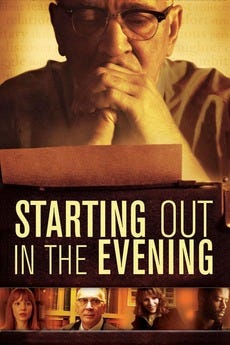Movie Review: Starting out in the Evening
A retrospective look at a film that writers can appreciate.
Starting out in the Evening directed by Andrew Wagner, 2007. Based on the book by Brian Morton.
Starting out in the Evening is a very poetically and realistically told story. It excels in its accurate portrayal of a fading writer who ultimately is pulverized by relentless time.
Frank Langella plays author Leonard Schiller who is visited by Heather Wolfe (Lauren Ambrose), a graduate student at Brown University who is writing her thesis on him. The film weaves the intricate pattern of their relationship while meshing it with Schiller’s daughter Ariel (Lili Taylor) and her on-again-off-again boyfriend, Casey Davis (Adrian Lester).
Langella’s performance stole the show. The actor executes dialogue true to his character – that is, true to an aging author of no particular interest. This is accented by the unique quality of Langella’s voice. It holds a deep, sophisticated tone. The wardrobe and body language clinches the character’s profile: an old fashioned man who is nonetheless open minded to today’s world and its standards.
Schiller’s interactions with Ariel prove this last point. His words, tone and body language express disappointment with her decisions. For example, she had an abortion at Davis’s command and then renews the relationship. However, Schiller’s disappointment is not so fierce as to estrange his daughter. On the contrary, they appear very close. The successful representation of Schiller’s duality is a bugle trumpeting Langella’s skill.
A large portion of the credit must go to the screenplay writer, Fred Parnes. Without his excellent dialogue Langella could not pull off the character. Moreover, the dialogue between Schiller and Wolfe is authentic – at least for two well-read writers. This is an enjoyable part of the movie and its absence would be a detriment to its style and its atmosphere that make it so authentic.
Wagner, too, adds some flavor to the mix. His cinematography is simple but effective. For example, the symmetry with which the film opens and closes (a close up of Schiller holding his hands in front of him; the camera pulls back to reveal a typewriter) reveals so much about the character’s psychology. That is, writing is his world and he’ll never leave it. The rest of the film reinforces this.
The love interest between Schiller and Wolfe is poorly paced, however. Its quickness would not be so bad if Schiller was any other man than he is. But Schiller is a sturdy, old writer who exudes tradition from his pores. The viewer cannot believe that a young woman would shake his foundation like he was an unconfident 40-year-old undergoing a midlife crisis. Also, one expects Wolfe’s bizarre behavior (rubbing sauce over Schiller’s face, for example) to repel him like Holden Caulfield when he sees two lovers spitting at each other.
But the pacing is a trifle. The film accurately captures the character it introduces; that alone makes any flaws forgivable. Langella’s acting and Parnes’ writing carries the film most of the way while Wagner’s subtle but revealing cinematography punctuates the film’s moodiness.
This is one of my favorite films. I highly recommend it.


